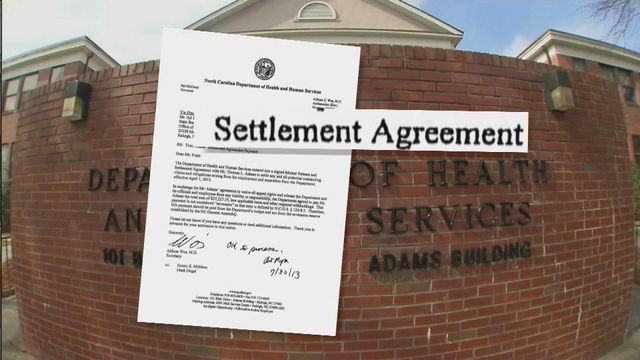Personnel experts: DHHS settlement may violate state constitution
Department of Health and Human Services officials may have violated the North Carolina Constitution when they cut a $37,000 check to an outgoing worker on the job for only a month, personnel experts say.
Posted — UpdatedRaleigh attorney Michael Byrne, who regularly represents state employees challenging their terminations, says the settlement appears to violate a section of the state constitution that explicitly prohibits payments to state workers for anything other than "public services."
That settlement, signed by DHHS Secretary Aldona Wos and approved by State Budget Director Art Pope on July 30, said DHHS would pay the sum "in exchange for Mr. Adams' agreement to waive all appeal rights and release the Department and its officials and employees from any liability or responsibility."
In a written response to questions from WRAL News, a personnel office spokeswoman said this waiver means it was not a gift of public money, which Article I of the constitution forbids.
But Adams never contested his separation from the job or filed a grievance, so he sought no legal fees. Payment data provided by DHHS show he received his regular salary as well as vacation payouts, so he was owed no back pay. As an exempt employee who could be terminated at will, he had no employment contract.
"I am utterly baffled as to why they would approve a nearly $40,000 settlement under those circumstances," Byrne said. "State agencies simply can't pay people money for nothing."
Adams did not return a call to his office at the North Carolina Captive Insurance Association, where he works as president and chief executive.
"The settlement agreement was prepared using a template provided to DHHS by [the Office of State Human Resources]; complied with all rules, laws and procedures; had the necessary reviews and approvals and the settlement agreement lists some of the claims released," DHHS spokesman Kevin Howell said in a written response.
Howell directed further questions to the Office of State Human Resources but did confirm that "a DHHS lawyer with knowledge of personnel laws" reviewed the agreement before it was approved.
But it appears the state did not follow its own rules before issuing the payout.
A personnel office spokeswoman said in a written response that OSHR Director Neal Alexander did not see the actual agreement before it was submitted to the budget office.
"[Alexander] has since reviewed the agreement and thinks that the terms of the agreement are appropriate," Margaret Jordan, OSHR public information officer, wrote in the statement.
As for why the agreement needed Pope's signature before Adams received payment, Jordan wrote that the governor can designate his ability to settle legal claims to the budget office.
"The State has the inherent authority to settle any legal matter, actual or threatened, against the State of North Carolina through the constitutional and statutory authority given to the Governor and the Council of State," Jordan wrote.
Regardless of the approval process, these types of payments weren't permitted when Drake Maynard retired from the personnel office in 2010. For almost a decade, Maynard managed approval of settlement agreements in collaboration with the attorney general's office.
One basic tenet, he said, was that there was "no way to give somebody a flat payment to shut up and go the hell away." He said the Adams payment was one he would not have approved.
"This is essentially violating the principle of the North Carolina constitution that you can't give state money away," Maynard said.
It's difficult to determine whether the McCrory administration or the cabinet departments under his Democratic predecessor, former Gov. Bev Perdue, have issued similar settlements in the past. OSHR bears the responsibility for reviewing many types of settlement agreements, but Jordan said the agency is not required to retain copies.
In response to a record request for all settlement agreements back to July 2012, the agency returned only about 40 documents, all of them agreements for legally allowable payments like back pay, benefits or attorney fees or retractions of disciplinary decisions.
The agreement for Adams was not included in OSHR's response.
"I'm not aware of any similar circumstance close to this in living memory," Byrne said.
But in 1995, Byrne pointed out, the North Carolina Supreme Court found that a $5,000 "retirement present" to a departing Warren County manager violated the constitution. Justice Robert Orr, ruling with the majority in Leete v. Warren County, said the constitution protects taxpayers from public officials who use their positions to "unduly secure added compensation."
"The wisdom of prohibiting such additional compensation for a public servant official upon his voluntary resignation, absent a contract stating otherwise, is grounded in the interest of good government and founded on sound reasons of public policy," Orr wrote.
If not under the same circumstances, there have been other high-dollar payments to departing employees.
Although Adams' payment runs counter to the guidelines Maynard wrote for the office before his departure, he said it could be the result of a simple mistake.
"We've got a new administration and new people, and maybe they're just not familiar with how things work," Maynard said.
• Credits
Copyright 2024 by Capitol Broadcasting Company. All rights reserved. This material may not be published, broadcast, rewritten or redistributed.






